Problems with the gums, their inflammation and bleeding are troubles familiar to many. As a rule, the first symptom of periodontitis is bleeding when brushing your teeth. Sometimes viscous saliva or often appearing plaque on the teeth may indicate the beginning of the inflammatory process of periodontal tissues.
If you carelessly treat such manifestations, a rather serious complication may develop. Advanced stages of the disease sometimes lead to suppuration in the gum pockets, displacement and loss of teeth. The submandibular lymph nodes may be enlarged. This condition requires long-term treatment.
The causes of gum disease can be very different. The dentist will always try to figure them out, and find a suitable way to solve the problem. Sometimes the sources of the disease are easy to identify and, eliminating all negative factors, quickly get rid of the disease. It is desirable for each person to know why the gums become inflamed, and for what ailments one should pay special attention to the state of periodontal tissues.
Bleeding gums
The following factors contribute to pathological manifestations:
- poor nutrition and lack of vitamins;
- tartar and bacterial plaque;
- inadequate oral hygiene;
- poor functioning of the immune system;
- smoking and alcohol abuse;
- various changes that occur in the body during pregnancy or taking hormonal drugs;
- heredity;
- taking certain medications(sedatives, medicines for the treatment of heart failure, oral contraceptives); diabetes mellitus, endocrine disorders, diseases of the gastrointestinal tract.
Periodontitis or inflammation of the gums, the symptoms of which at first may seem insignificant, is a fairly serious disease. If you simply remove the signs of the disease without eradicating the causes, a relapse is possible.
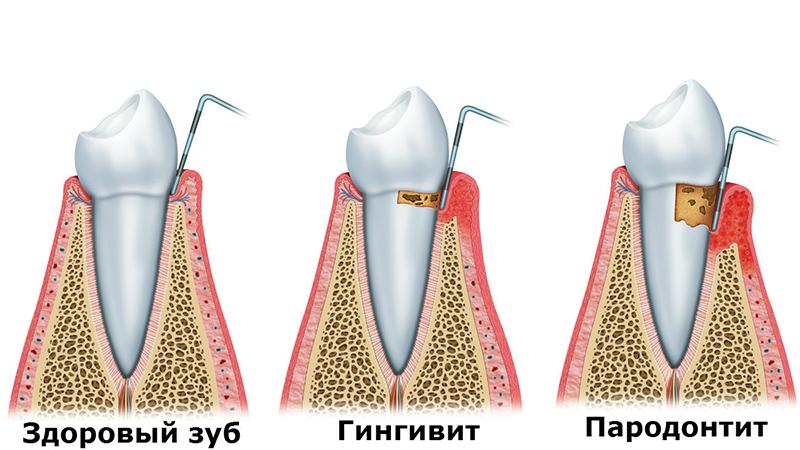
Periodontitis
Therefore, it is important to understand what caused periodontitis and make every effort to combat it. Only this approach provides complete relief from the disease.
Swelling and inflammation of the gums, the causes of which can often be identified after a comprehensive examination of the body, is a serious reason to see a doctor and pass the necessary tests.
Various factors that provoke periodontitis
There are many conditions and complications that can cause gums to ache and bleed. Each case is individual. Inflammation of the gums, the photo of which on our website illustrates the symptoms of such a pathology, occurs due to hormonal disruptions, improperly performed dental operations, against the background of caries.
Prosthetic errors
Crowns and bridges installed on the teeth sometimes cause allergic manifestations. Various orthodontic designs can be made of metal or plastic. The human body prepares a peculiar response to foreign substances, expressed by allergies and inflammation.
However, when the gum became inflamed directly under the installed crown, what should I do in this case? As a rule, the doctor in this situation excludes the influence of allergens. As usual, an incorrectly made prosthesis causes an inflammatory process in periodontal tissues. Sometimes the design is oversized. The crown puts pressure on the gums and causes swelling and bleeding. Therefore, you need to remove the wrong prosthesis and put a new one.
Inflammation of the gums against the background of the eruption of the eighth teeth
Every person has ever experienced the eruption of third molars or the so-called wisdom teeth. As a rule, this process is accompanied by severe pain. The appearance of the eighth teeth in a row is often accompanied by inflammation of the gum pockets. This condition is called pericoronitis by dentists.
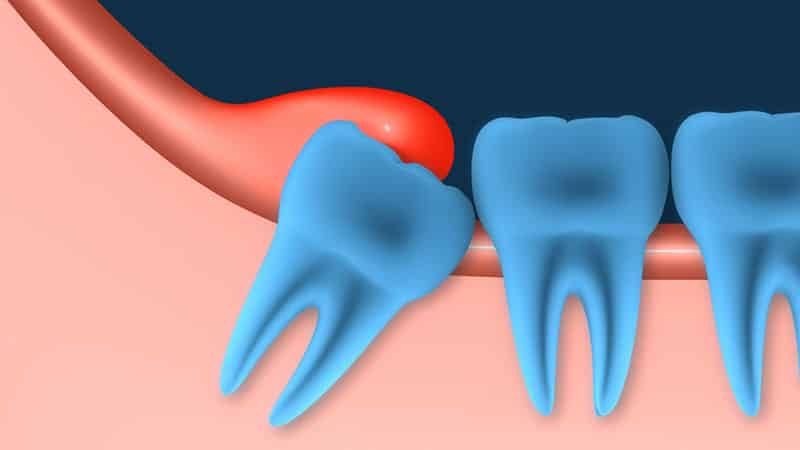
pericoronitis
The mucous membrane of the alveolar processes covering the tooth is injured. An infection quickly develops at the site of injury. The gum tissue becomes inflamed.
If the teething of wisdom teeth is difficult, it is better to consult a dentist. An experienced doctor will tell you what to do with inflammation of the gums and pericoronitis. Sometimes you have to make an incision on the mucous membrane, facilitating the eruption of "eights". Your doctor may then prescribe anti-inflammatory rinses and antibiotics if you have a fever.
Alveolitis of the socket after tooth extraction
Sometimes the gum begins to swell in the place of the hole of the extracted tooth. Redness, suppuration, and an unpleasant odor may occur.
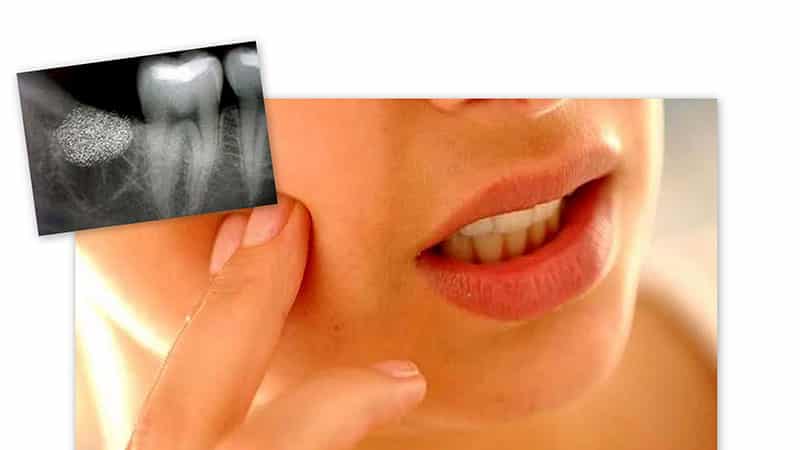
An inflammatory process may develop at the site of tooth extraction.
As a rule, with severe incessant pain, patients go to the doctor. The main cause of alveolitis of the hole is the spread of infection in it..
This often results from the use of contaminated dental instruments. Immediately after tooth extraction, a gauze swab is applied to the hole. It is too early to take it out, however, it is impossible to keep it in the mouth for a long time. If a blood clot does not have time to form, the wound will remain open to infection.
Periodontitis as a consequence of contact caries
Carious cavities can appear not only on the visible surfaces of the teeth, but also in the interdental spaces. This phenomenon is called proximal or contact caries in dentistry. It is not always possible to immediately detect the problem. Often you can see the destruction only from the palatal surface of the teeth.
In some cases, after the filling procedure, patients noticed that their gums were inflamed between their teeth and hurt. What to do in such a situation and what are the causes of this pathology?
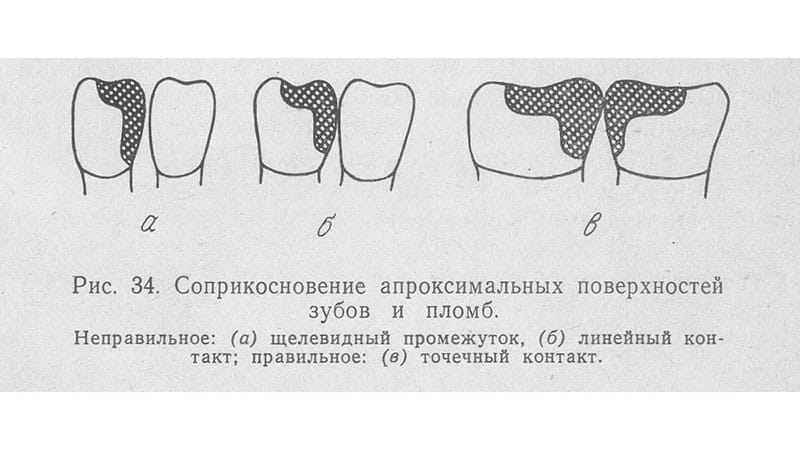
Options for applying filling material
As a rule, incorrect installation of the filling leads to strong pressure on the surrounding soft tissues and inflammation of the periodontium. This problem requires urgent elimination, since it is fraught with very unpleasant consequences in the form of necrosis of the gingival papilla. In this case, there will be a need for long-term complex treatment. The appearance of such symptoms should immediately make you see a doctor.
Complications of caries
Common diseases when there are carious cavities in the teeth are periodontitis and pulpitis. The inflammatory process that occurs in the loose tissue of the internal cavity of the tooth (pulp) or the periodontal complex can spread to the tissues surrounding the root of the tooth.
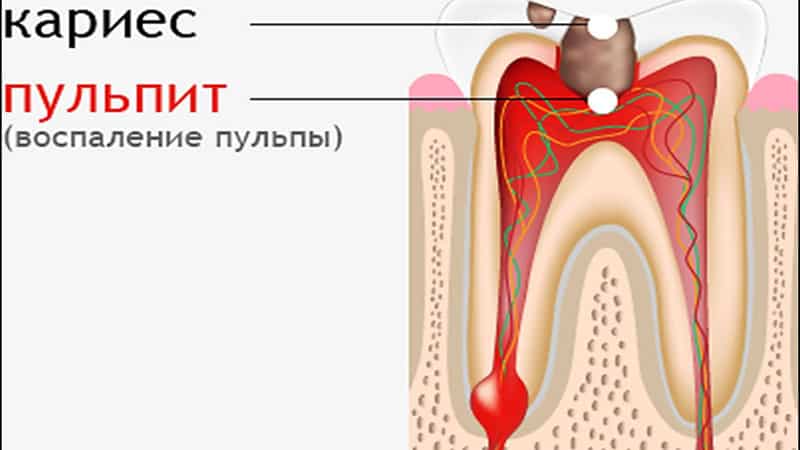
Pulpitis as a result of complications of caries
Sometimes this is accompanied by suppuration and gum abscess.
Periodontitis can also develop at the edge of the hole. Sometimes doctors observe such manifestations in children on milk teeth.
The disease can lead to tooth loss. If there are signs of periodontitis, you should immediately consult a dentist. You can not self-medicate and rely only on traditional medicine. They will provide little relief and will only help relieve some of the symptoms.
Flux, gingivitis and gum disease
Gingivitis is an uncomplicated inflammatory process on the gums that does not destroy the integrity of the tissue of the periodontal junction. This pathology occurs due to reduced immunity in children, expectant mothers, and people in old age. As a rule, if the gums turn red and become very inflamed, the dentist will tell you what to do with gingivitis. This can be a thorough cleaning of the oral cavity in a clinic, the appointment of various medicines.
Periostitis or flux, as it is popularly called, is a much more serious disease. This is the process of inflammation of the periosteum of the upper or lower jaws. The disease is accompanied by swelling of the gums, severe pain. If you do not seek medical help in time, an abscess develops, the cheek swells up badly.
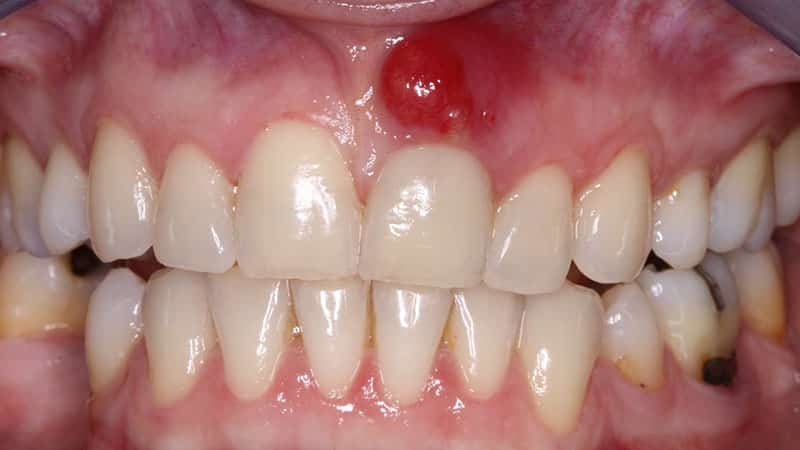
The appearance of an abscess on the gum
Often, surgery is required.
First aid for inflammation
What to do if the gums are inflamed and sore, but there is no way to immediately go to the doctor? Sometimes the process can be very pronounced and capture nearby lymph nodes.
It is important not to apply hot compresses to the affected areas, as this can aggravate the course of the disease and significantly worsen the patient's condition and lead to complications.
You can use rinses. Such funds will help to reduce some pain and inflammation before a visit to the dentist.

Gargling can be an effective remedy for inflammation of the gums.
For this, a solution of furacilin, chlorhexidine, miramistin is used.
If necrosis develops, irrigation with enzymes and hydrogen peroxide is applied. These funds contribute to the rapid healing of injured tissues.
Recipes for herbal infusions for rinsing
Along with other doctor's prescriptions, you can use herbal tinctures and decoctions of medicinal plants.
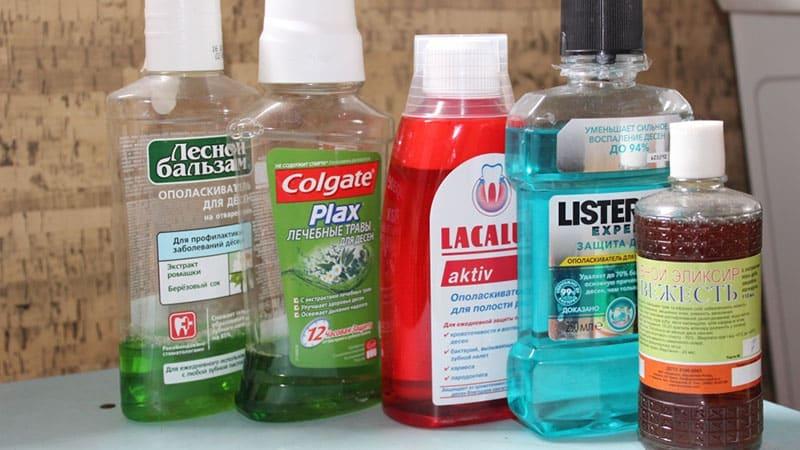
Mouthwashes
You can prepare a saline or soda solution. This is an effective remedy available to everyone for teething wisdom, pain in the gums. Nevertheless, it is always necessary to consult a dentist before using the achievements of traditional medicine.
To prepare solutions, you can buy chamomile, sage, oak bark, calendula flowers. Not bad help relieve inflammation and stop bleeding, herbs such as St. John's wort and nettle
Horseradish roots are also used to treat gingivitis. They need to be thoroughly washed and cleaned, chopped. The resulting slurry is spread on gauze and the juice is squeezed out of it. Then mix it with water in equal proportions. This solution is used for rinsing. This procedure can be repeated several times during the day.
To relieve inflammation of the gums, there is another popular recipe. Cottage cheese is rubbed with a small amount of fresh lemon juice. For 100 grams of fermented milk product, one teaspoon of juice is enough. This delicious medicine is taken orally 2 times a day.
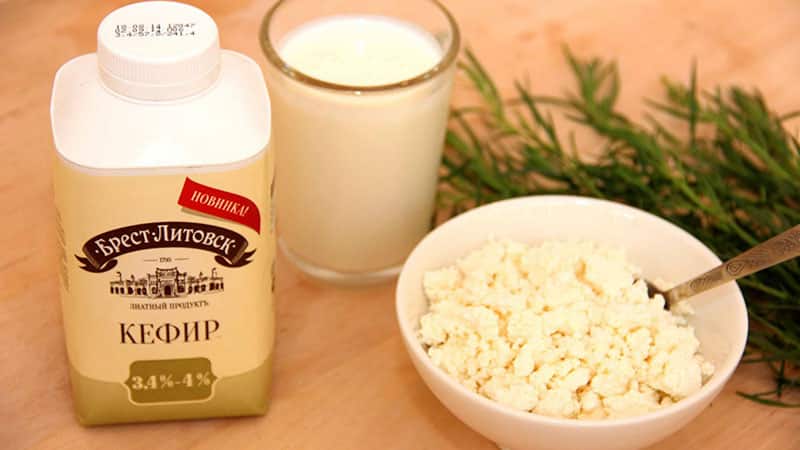
Dairy products are an essential source of calcium
Symptoms of gum disease
The acute process is characterized by reddening of periodontal tissues, bleeding, swelling and pain. When the disease becomes chronic, there is swelling, cyanosis, gum tissue becomes loose. Gingivitis is often accompanied by the appearance of tartar.
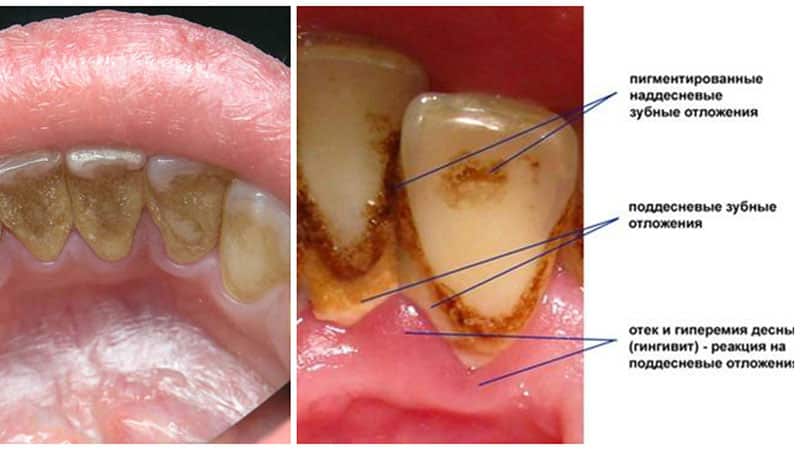
Tartar formation
How to treat
Usually, after the dentist makes a diagnosis, patients are prescribed anti-inflammatory drugs, sometimes antibiotics. As a rule, an integrated approach is used in the treatment of periodontitis and gingivitis. Often, doctors additionally prescribe immunostimulating drugs. At the same time, it is important to carry out high-quality sanitation of the oral cavity, cure caries, remove tartar in order to avoid recurrence of the disease.
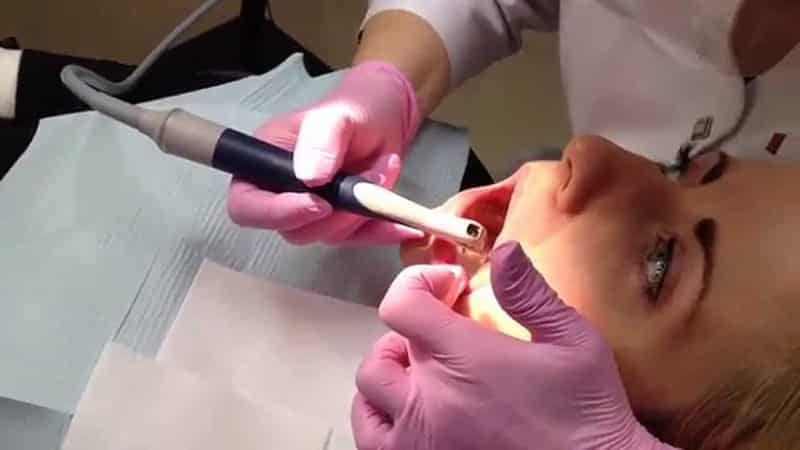
If you have gum disease, you need to see a dentist
These procedures must be carried out in a dental office. Home remedies and medicinal herbs serve as complementary restorative therapy.
Proper oral hygiene is essential to prevent gum disease. It is necessary not only to brush your teeth several times a day, but also not to neglect the use of dental floss or floss. It is important to strengthen the natural protective properties of the body and eat right, use vitamins.
The inflammatory processes of periodontal tissues cannot be treated lightly. If you have found signs of diseases such as gingivitis, periodontitis or pulpitis, you should not postpone a visit to the dentist and do not self-medicate.
Bleeding gums Scheme of development of periodontitis Pulpitis as a result of complications of caries Rinsing can be an effective remedy for inflammation of the gums Dairy products are a necessary source of calcium

